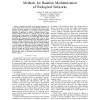Free Online Productivity Tools
i2Speak
i2Symbol
i2OCR
iTex2Img
iWeb2Print
iWeb2Shot
i2Type
iPdf2Split
iPdf2Merge
i2Bopomofo
i2Arabic
i2Style
i2Image
i2PDF
iLatex2Rtf
Sci2ools
98
Voted
BIBE
2006
IEEE
2006
IEEE
Methods for Random Modularization of Biological Networks
— Biological networks are formalized summaries of our knowledge about interactions among biological system components, like genes, proteins, or metabolites. From their global topology and organization one can learn nontrivial, systemic properties of organisms. In studies of biological network organization empirical networks are typically compared to random network models, and features are identified as important if they are statistically ”unusual,” i.e. occur surprisingly often or seldom. Naturally, more representative random models result in better feature identification. Since biological networks exhibit a modular structure (mostly pertaining to their hierarchical functional organization), random network models need be modular similarly. In this work we consider the problem of generating random network models that incorporate network modularity. Theoretically, the problem is equivalent to generating random decompositions of a graph into a given number of connected components....
BIBE 2006 | Bioinformatics | Biological Networks | Random Network Models | Representative Random Models |
Related Content
| Added | 10 Jun 2010 |
| Updated | 10 Jun 2010 |
| Type | Conference |
| Year | 2006 |
| Where | BIBE |
| Authors | Zachary M. Saul, Vladimir Filkov |
Comments (0)

